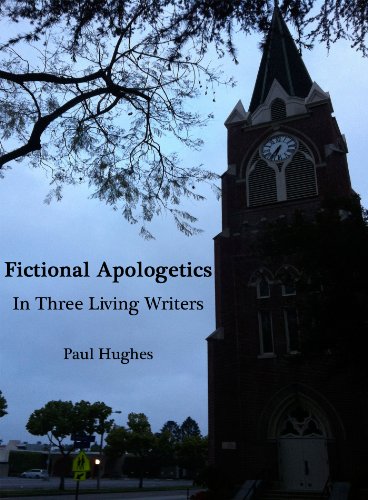Academic and research treatment of the discipline and practice of Fictional Apologetics in three contemporary American writers: Wendell Berry, Ron Hansen, and Tim Gautreaux.
Fictional Apologetics In Three Living Writers


Academic and research treatment of the discipline and practice of Fictional Apologetics in three contemporary American writers: Wendell Berry, Ron Hansen, and Tim Gautreaux.
I am not saying Christians are like coyotes. [For that, some could cut caustically to coyotes are like Christians — tricksters, roaming in the dark, feeding on the dead … ] Simply noticed — somewhat in passing, as it’s said, having attained, apparently … achieved? … some kind of state where nearly anything I hear,
Short answer: he did not. Neither did Prince Myshkin, that we know of. Likely both believed it. Beauty — in the person of Christ — will do so. And clearly D wrote of M in The Idiot to explore art and beauty and ugliness and salvation. But did he say it, and did he believe that
[Television is educational.] One Saying the same stuff over and over looks like you have different things to say. Two If you’re ever in a below-average film or streaming series, and you beat the tar out of a guy, in a house, and you gaze down in both some shock as also a certain
A line everywhere misattributed to Chesterton reads thus: The young man who rings the bell at the brothel is unconsciously looking for God. This line is not from the great [several senses of the word] man who recently celebrated his 150th birthday, but the mid-century most unmodern novelist Bruce Marshall. The words — which do
The one thing I know about The Dark Knight Rises is that it’s the most boring action movie I’ve seen in years, and yes, I saw The Expendables. But it might not be an action movie. So apart from the surety there, my thoughts remain roundaboutly, which is just, considering the movie itself. And the
Not God is the phrase they use in AA for realizing we are, well … not God. And no, I’m not an alcoholic. No really — I’m not. Not God is also the answer to the question, WTF? What is wrong with people, this place, my parents, and our upbringing, education, choices and decisions, and probably
This is part two of a two-part post on why, some 45 years later, Columbo still matters. Part one is here. This essay is excerpted from The Columbo Case Files: Season One, found here. Thank you. * I now have the entire collection, all 35 years, nearly 70 episodes in all, and I’ve seen each
Is ballet a sport? The question is asinine in at least two ways. Of course it is, whether one is asking does it qualify as one or simply based on the assumptions implicit in the question itself. To put it as stupidly, would a Ferrari fit in my garage? Is Rivendell a better deal than
These 21 essays, some quite short, cover everything from truth and love, to our humility and happiness, to celebrating meals and cursing God, to baseball and Johnny Cash. Thanks for reading.
Can he play? Should he pray? What’s next for Tim Tebow? … This book asks those questions — and answers them. Thanks for reading.
What’s so wrong with hypocrisy? Other than it being dishonest and demeaning to all that we are as humans … is it really that bad? Actually it can even be good. So, take a look at this book by a hypocrite for hypocrites. Promise you won’t regret it.
Tim Keller has said that our sinfulness is far worse than we ever could imagine, and that God’s love is far more than we ever dared hope. And Christians for millennia have affirmed no better way to learn these truths – and many others besides – than to love God with all our heart and